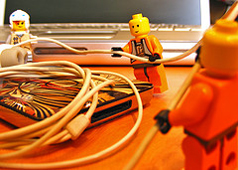This post is, in part, me talking to myself about my schedule today. I have been putting off a difficult task for a week or more, and I know I have to address it today. I don’t want to, because it will mean I’ll have to do things I don’t want to do.
If you stop to think about it, the most difficult tasks are often the most important. I’m sure you can think of your own list of difficult tasks, and I’ll bet they include one or more of the following:
- Addressing (I looked for another word, but everything else I could think of implied some sort of judgment) a people problem — a broken relationship, an excrement-disturber, a bully, a financial incompetant, an addict…
- Addressing (let’s just keep using that word for a while) an unstarted or non-working portion of a task that is so complicated that a multiplicity of other tasks are stopped until this one problem is fixed
- Addressing the need to update a long-held belief or opinion because new information has shown it to be incorrect
In some ways, I could just say “changing” and it would cover most everything.
In my field of expertise (that point at which teaching and conducting intersect in ministry), one of the most difficult tasks is focusing upon fundamentals: helping people understand how working on the basics of singing and musicianship will actually make singing music more fun in the long run.
Adopting the Mary Poppins approach (“a spoonful of sugar makes the medicine go down”) is one solution, but, to my mind, it teaches people that difficult tasks should only be attempted if there’s a treat involved and that treat masks the real task. I’ve railed about human nature’s diminishing ability to postpone instant gratification before, but this is something else: avoidance because there’s no sugar.
But, as Malcolm Gladwell points out, the most successful practitioners of any endeavor seem to share one characteristic: they’ve put in 10,000 hours mastering the task. And a lot of that time is spent doing the difficult things. That means not just addressing the fundamentals, but also the problems that are inherent in any chosen field.
The difficulty in addressing the difficult tasks comes from two things:
- lack of time
- lack of discipline
and I suppose, in some respects they are one and the same.
The solution seems to be making the time, and having the discipline to tackle the difficult tasks — not easy to do, but certainly possible. The reward, at least in my experience, is that tasks are generally not as difficult as they seem once you get started, and that the greatest satisfaction comes from accomplishing the most difficult tasks.
I’m not saying that you should only do difficult tasks. But avoiding the difficult tasks can be counterproductive, and, in many ways, inhibiting.
So fear not…you can conquer those difficult tasks, and doing so will only enable you to accomplish more and better things.
What are your most difficult tasks? How do you address them? Please leave a comment and let me know what you think.
…
You can follow me on twitter here
Get my EBook The Choir in Modern Worship here
Join me on facebook here











{ 2 trackbacks }
{ 2 comments… read them below or add one }
Thanks for this word of encouragement. I have been wrestling with this all week. This time of year, as programs start up for the fall, is the worst. I hate making phone calls, and I have some I have been dreading to make. Like you say, once I do this, it is usually not so bad, but I always go in to it with a sense of dread – hence I procrastinate. For me, it is like a switch goes off in my head, and the cliche of, “is the glass half empty, or full”. It is much easier if I can get myself to think positively about each interaction.
Thanks for the comment, Tim. Calling someone up is one of my most avoided tasks, but when I do it, generally I’m glad I did.
How do you get yourself to think positively?
You must log in to post a comment.